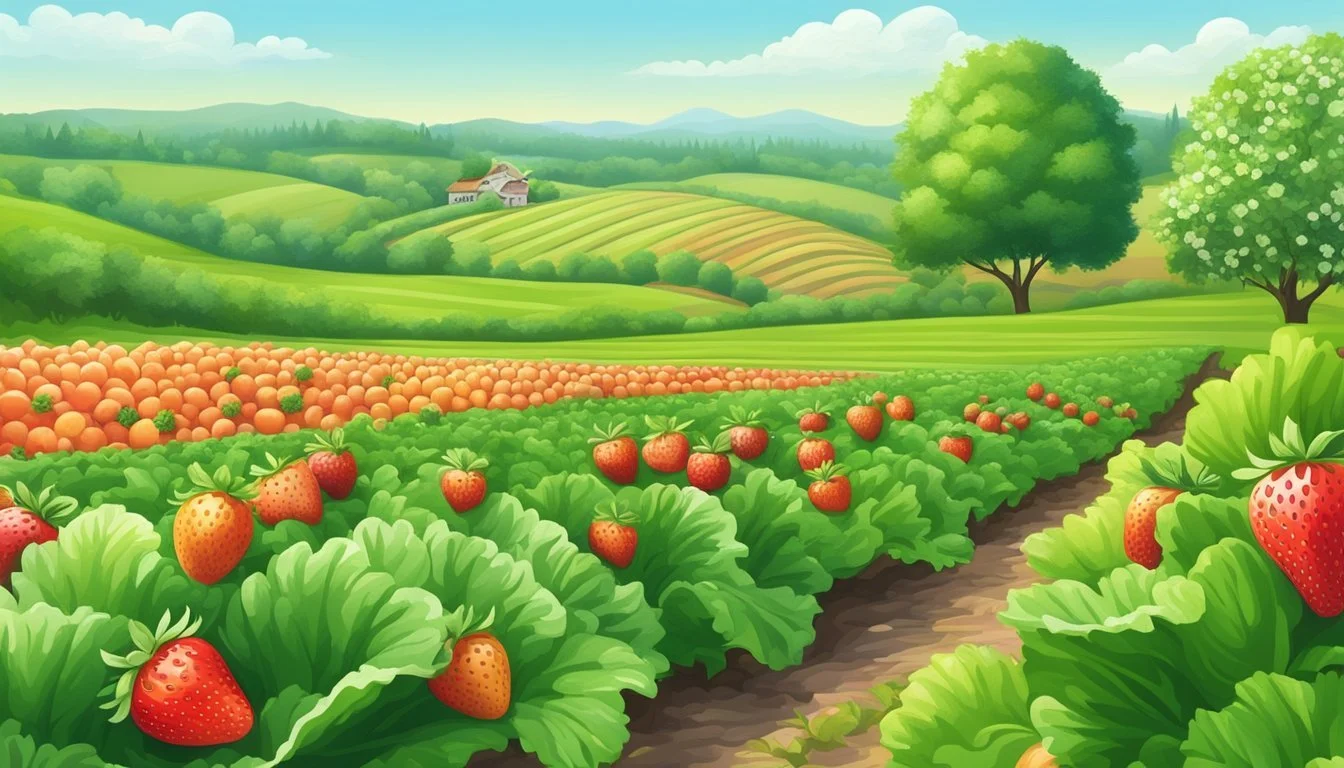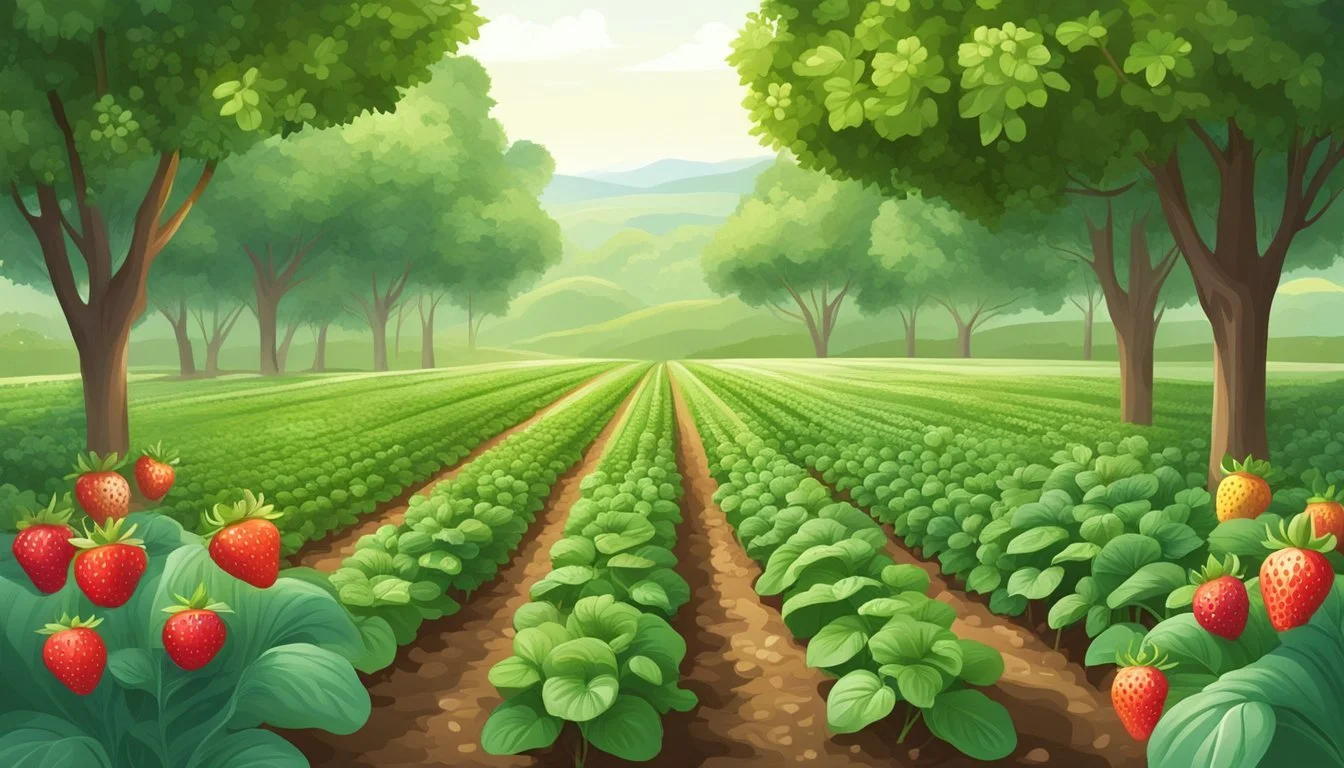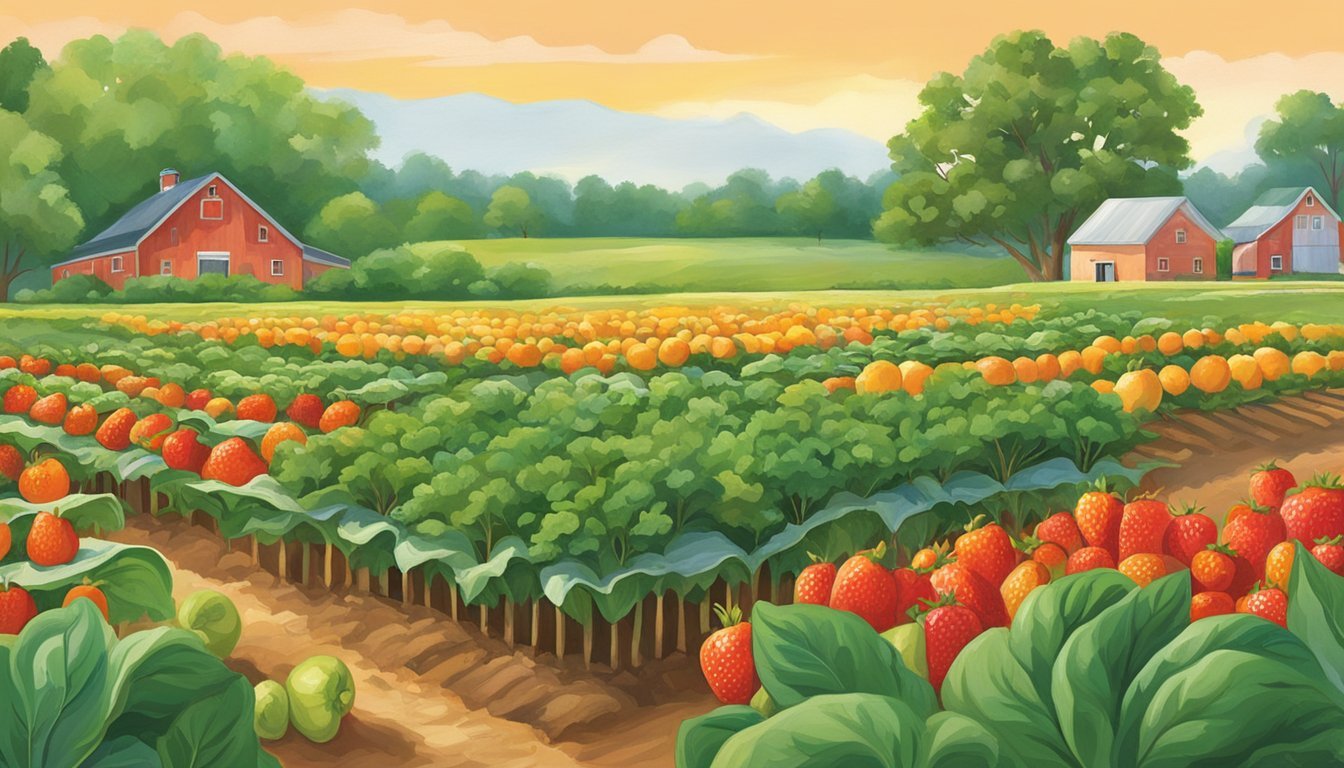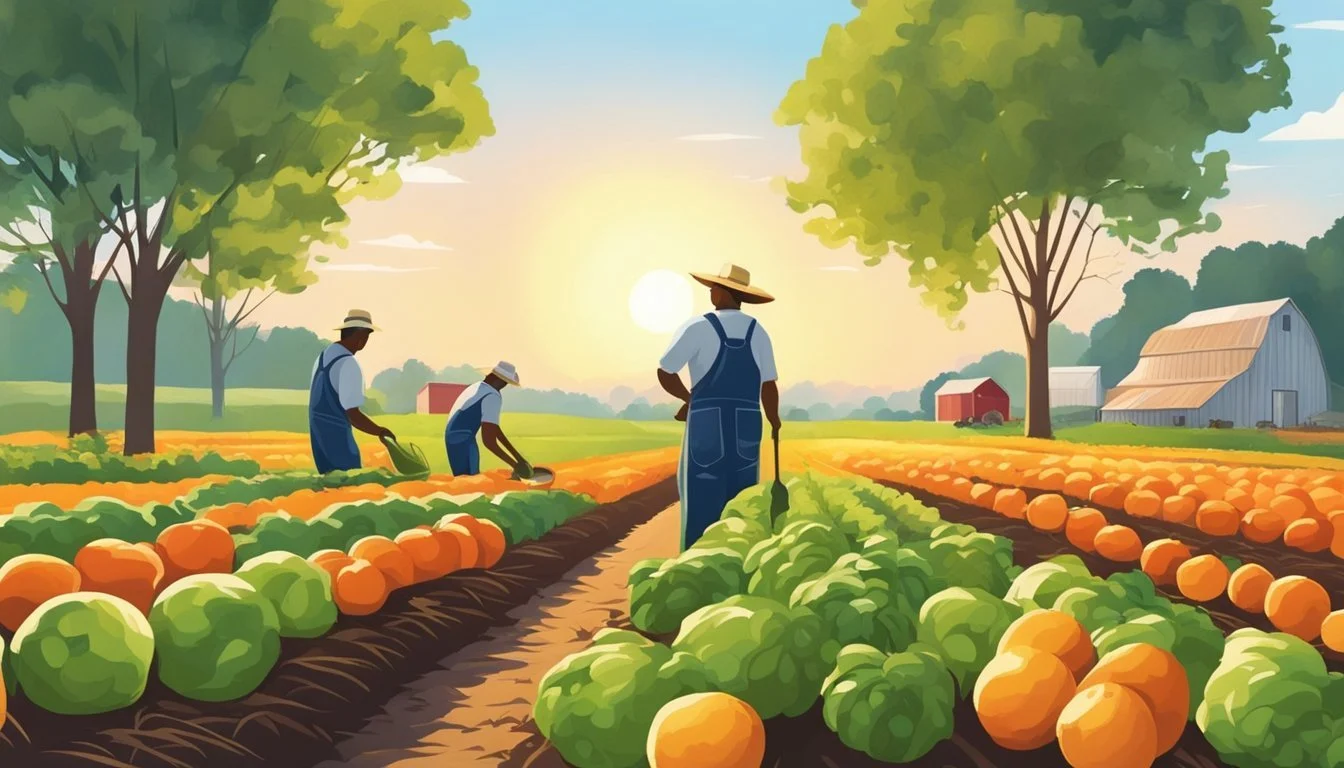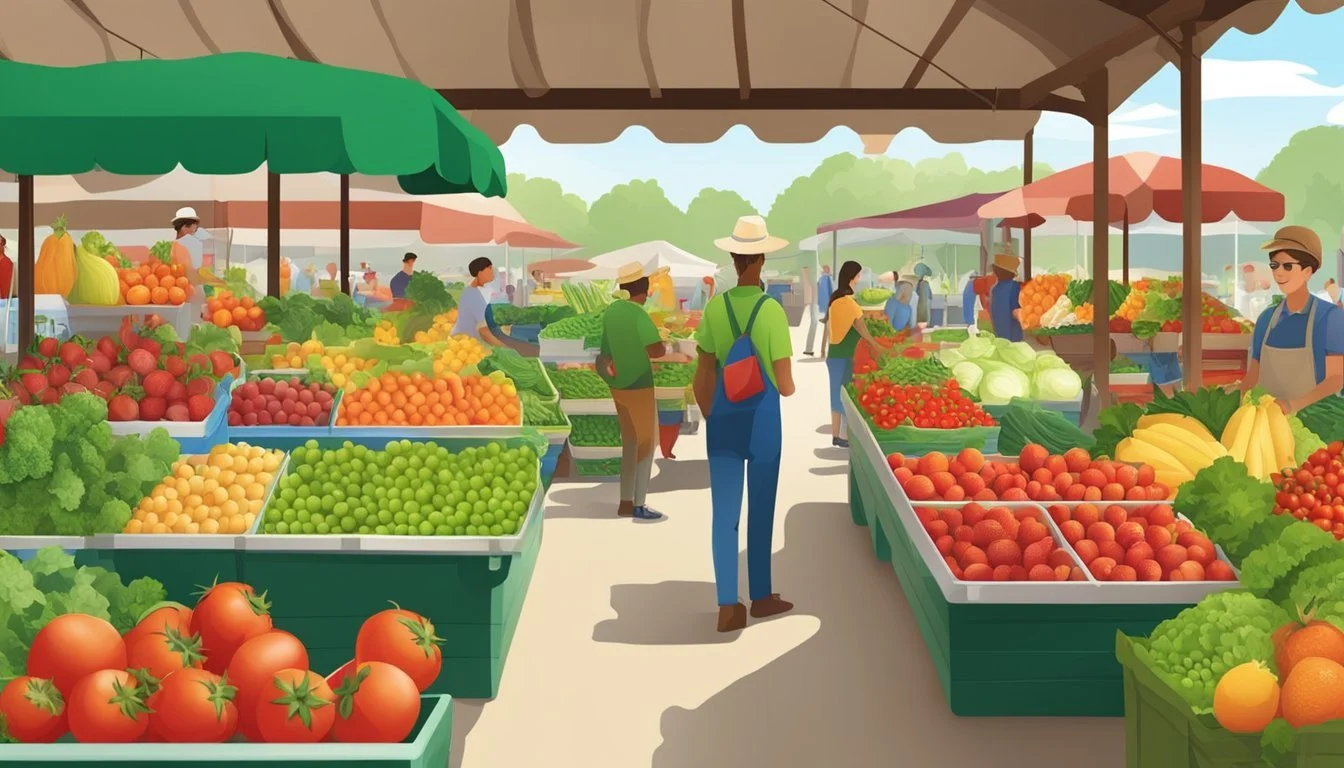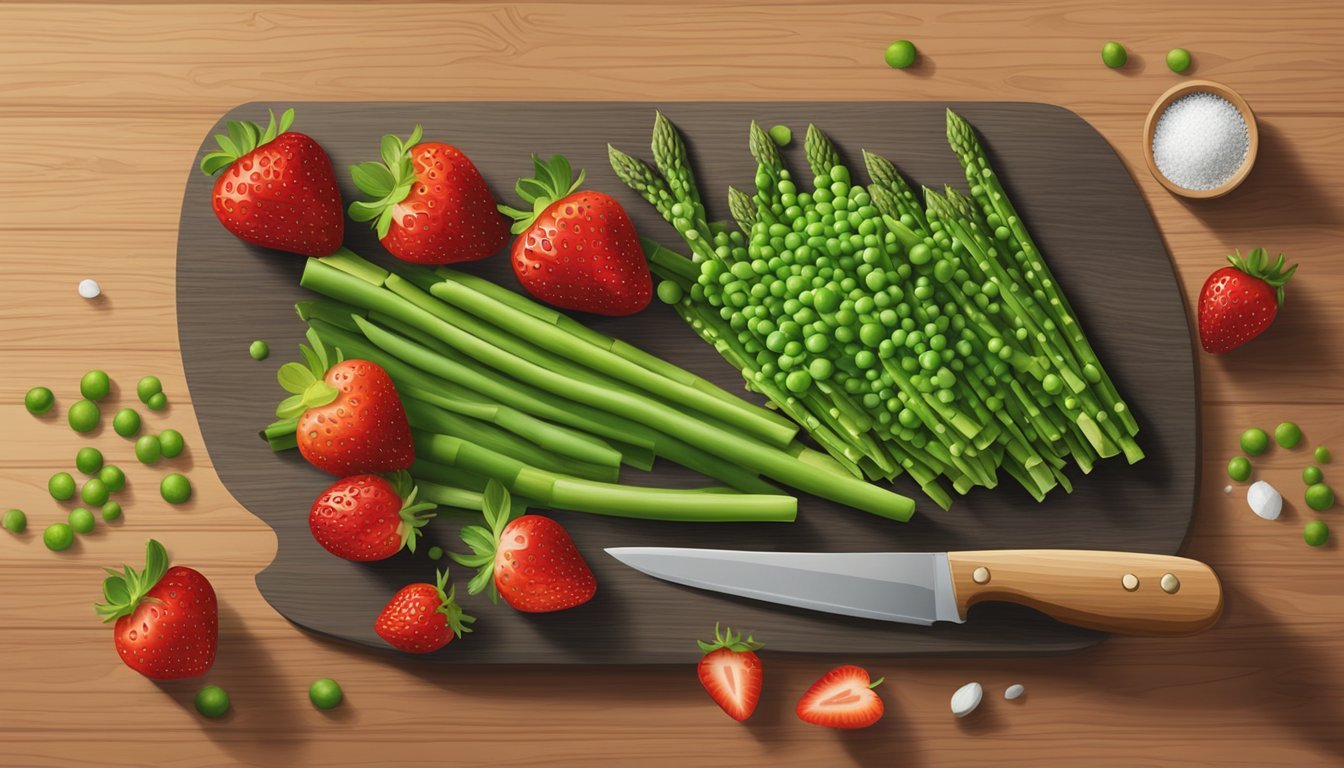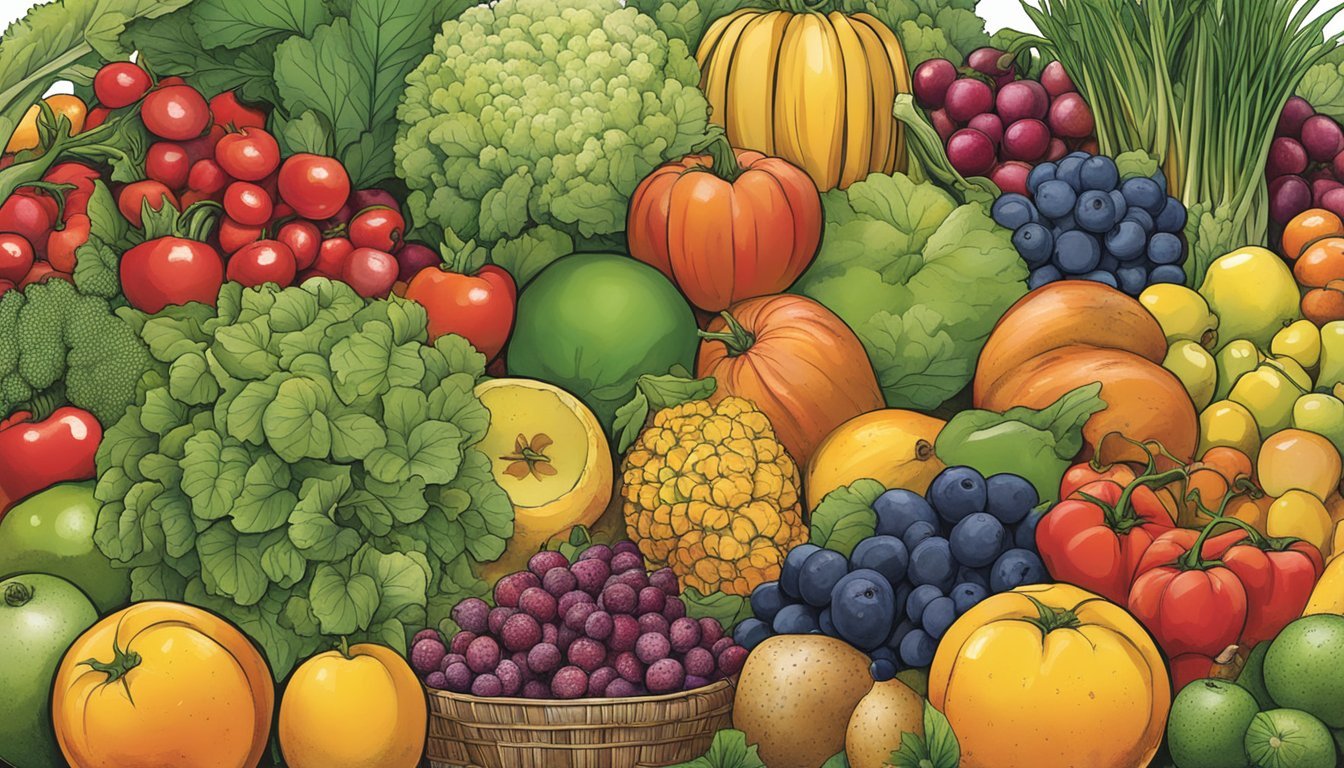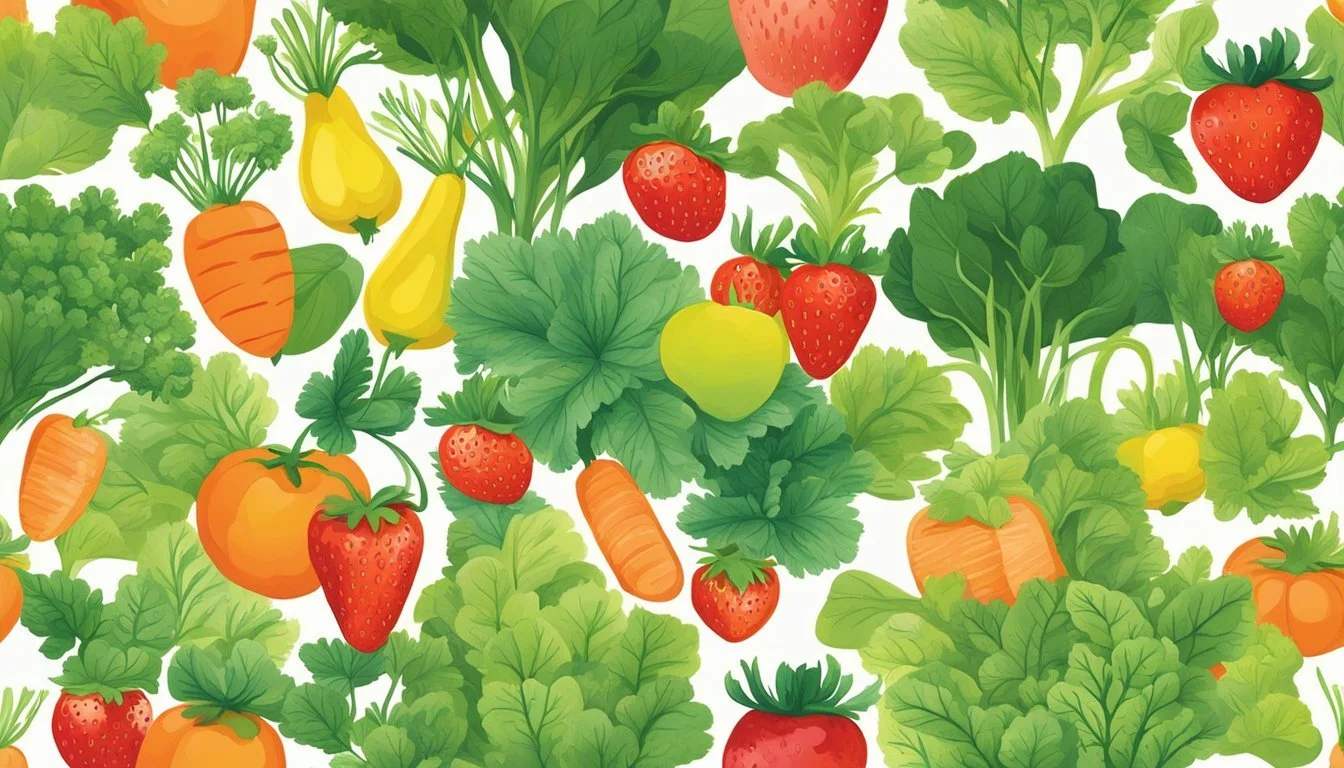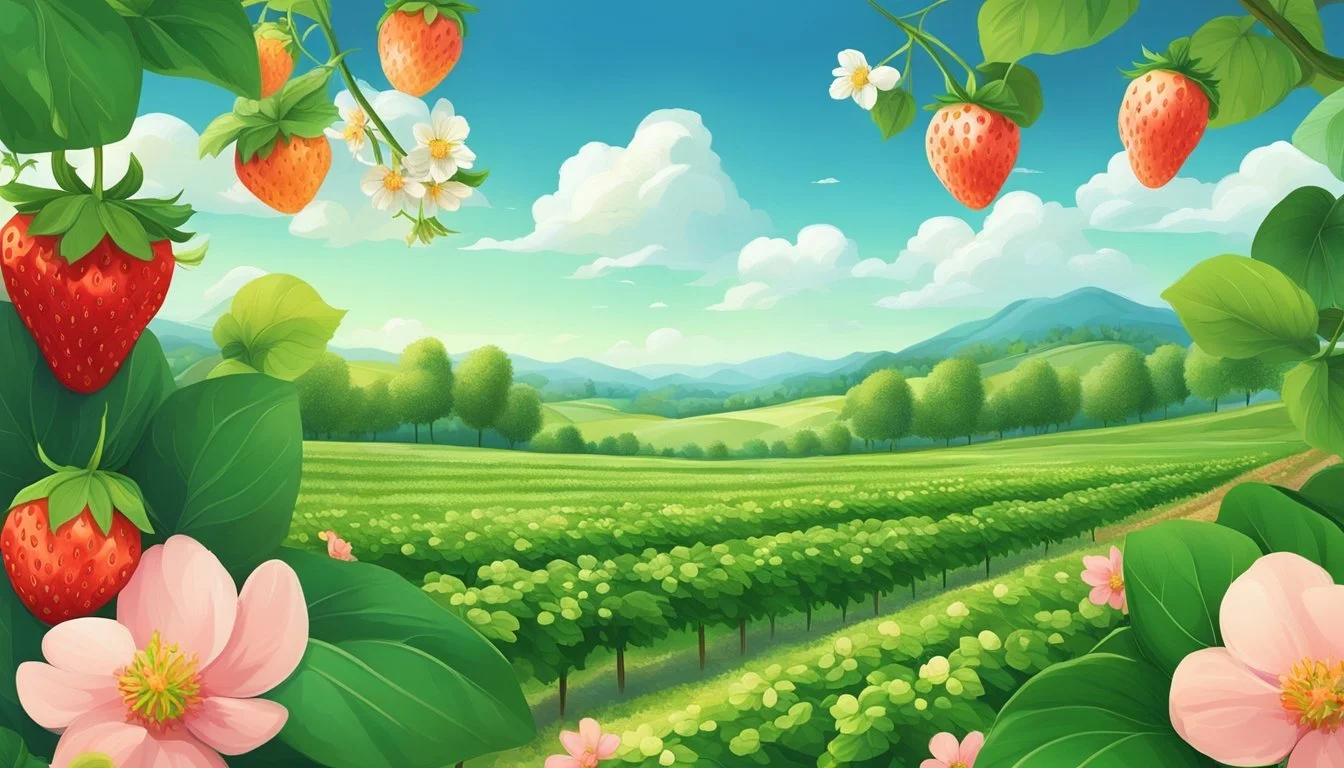Mississippi Seasonal Fruit & Vegetables in March
Your Guide to Fresh Produce
This Article is Part of our Mississippi Seasonal Fruit & Veg Calendar
Mississippi's climate ushers in a variety of fresh produce throughout the year, with a notable shift in availability as winter yields to the slow warmth of spring. March is a transitional month in Mississippi's agricultural calendar, bridging the tail end of winter crops with the early signs of spring's bounty. Consumers and chefs alike look forward to the harvest that provides fresh flavors after the colder months.
In March, the state's fertile soil begins to offer cool-season vegetables that thrive in the still-chilly nights and gradually warming days. Root vegetables such as beets (how long do beets last?) continue to be harvested, while leafy greens like chard show their resilience to the cool weather. The diligent planning of Mississippi's farmers ensures that these and other vegetables like broccoli (how long does broccoli last?)and cabbage reach markets at their peak quality.
With the progression of the season, the preparation for warm-season crops also gets underway, setting the stage for the diverse and vibrant produce to come. While the fields are readied for the likes of sweet corn and cucumbers, consumers can enjoy the current offerings that signify spring's return. The transition period of March is a testament to the diversity of agriculture in Mississippi and the state's ability to provide a succession of fresh and nutritious in-season produce.
Understanding Seasonality
Seasonal produce refers to the fruits and vegetables that are at the peak of their supply and taste during a particular time of year. In Mississippi, the month of March signals the beginning of spring, a transition period where the produce selection begins to shift from winter staples to early spring offerings.
Defining Seasonal Produce
Seasonal produce is defined by the periods during which various fruits and vegetables are naturally at their best quality and flavor. For example, in Mississippi, a seasonal calendar informs consumers about which produce is in season. During spring, one might find a variety of leafy greens and root vegetables, while summer could bring a bountiful supply of stone fruits and berries. Fall might showcase a range of squash and apples, transitioning into winter where citrus and hearty vegetables thrive.
Lists or tables often present this information in a way that is easy for consumers to interpret. These resources are valuable for both home cooks and professional chefs alike, ensuring that the ingredients they use are both fresh and in alignment with nature's cycles.
Mississippi Seasonal Cycles
In Mississippi, March marks a crucial transition period for growers as they harvest spring crops and prepare the soil and beds for summer planting. The careful coordination of these activities ensures a continuous yield of fresh produce.
Spring Harvest
During March, gardeners in Mississippi are busy collecting the yields from their cool-season vegetables. They can expect the final harvests of crops such as beets between early to mid-March, depending on the specific planting zone. This time also brings the last opportunity to enjoy the full flavors of spring produce before the warmer months set in. Here's a list of typical spring harvests in Mississippi:
Beets: February 1 - March 1 (Zone 1)
Lettuce: Often harvested through March
Greens: Including collards and kale, typically available
Summer Preparations
As the state enters late March, growers begin sowing seeds for summer vegetables. The soil starts to warm, making it ideal for planting summer crops. By June, many of these will be reaching maturity. Crucial summer preparations during March include:
Enriching the soil: Adding compost and fertilizers
Planting summer crops: Depending on the zone, starting indoors where appropriate
Scheduling: Ensuring there is no gap between spring harvest and summer planting
Mississippi gardeners understand the importance of these months for securing a bountiful summer harvest.
March Specifics
In March, Mississippi's farmlands bring forth a vibrant selection of nutritious vegetables and juicy fruits. This is a pivotal transition time from the last chills of winter to the beginnings of spring's warmth.
Early Spring Vegetables
Broccoli: In March, they are at the tail end of their season, offering rich, flavorful florets.
Cabbage: This leafy green is bountiful, perfect for hearty meals.
Carrots: They continue to be a crunchy, sweet staple in gardens and markets.
Lettuce: Both leaf and head varieties are fresh and abundant during this period.
March Fruits Availability
Strawberries: As the weather warms, strawberries start to come into season, hinting at the sweet abundance of late spring.
Harvesting and Planting
In Mississippi, March represents a transitional period in gardening, where the focus shifts from harvesting cool-season vegetables to planting crops that will thrive in the approaching warmer months.
Cool-Season Vegetables Planting
During early March, gardeners in Mississippi are typically harvesting their cool-season vegetables. These vegetables, which include species like beets and green onions, can withstand the cooler temperatures that linger at the start of the month.
Planting Dates for Cool-Season Vegetables:
Vegetable Planting Date Range in March Beets Zone 1: Feb 1 - Mar 1 Zone 2: Feb 12 - Mar 15 Zones 3 to 5: Feb 22 - Apr 5 Onions Jan 1 - June 1 (Green Onion)
Preparing for Warm-Season Vegetables
As the soil begins to warm, Mississippi gardeners prepare for the planting of warm-season vegetables like beans and watermelons. These crops require warmer soil and are not tolerant of frost. The planting typically begins when the threat of the last frost has passed, entering the warmer seasons optimally poised for growth.
Planting Dates for Warm-Season Vegetables:
Warm-season vegetables should be planted after the last median frost date for the zone.
Specific dates can vary, but tend to fall after the cool-season vegetable planting window.
It is essential for gardeners to refer to local frost dates and adjust their planting schedules accordingly to ensure the success of their vegetable gardens.
Shopping for Produce
When shopping for produce in Mississippi during March, consumers are faced with a variety of fruits and vegetables coming into season. High-quality produce is essential for nutritious and flavorful meals.
Selecting Quality Vegetables
When selecting vegetables, shoppers should look for firm texture and vibrant color. Vegetables like lettuce should exhibit crisp leaves without brown edges. Root vegetables, commonly found in Mississippi grocery stores during March, should feel solid and heavy for their size. It is important to steer clear from any vegetables with soft spots or signs of spoilage.
Lettuce: Look for fresh, green leaves.
Onions: Choose ones that are firm and free of sprouts or soft spots.
Finding Fresh Fruits
Fruits at their peak in March must be carefully chosen for freshness and quality. For fresh fruits such as strawberries, one should check for bright color and avoid any that have mold or are dented. Since fruits like strawberries begin to come into season in Mississippi during this month, they can often be found at local markets with a higher freshness level compared to those out of season.
Strawberries: Seek out bright red berries, and ensure they are plump and free of mold.
Culinary Applications
Seasonal produce enhances dishes with peak flavors and nutrition. March in Mississippi offers a variety of vegetables and fruits perfect for fresh preparations and infusions.
Fresh Vegetable Dishes
Vegetables like asparagus and green beans come into season in March. Cooks should consider steaming or grilling these vegetables to maintain their crisp texture and vibrant color. Incorporating them into a salad with a light vinaigrette dressing can highlight their freshness.
Steamed Asparagus: A side dish where asparagus is lightly steamed and served with a drizzle of olive oil and a pinch of salt.
Green Bean Salad: Tossed with cherry tomatoes and feta cheese, this salad pairs well with a lemon herb dressing.
Fruit-Infused Recipes
March's seasonal fruits can be used to create flavor-infused dishes that are both refreshing and bold. These fruits are not just for eating raw but are brilliant for cooking and infusing flavors into both sweet and savory recipes.
Strawberry Dressing: Puree fresh strawberries for a sweet and tangy salad dressing.
Tropical Fruit Salad: Combine mango and other available tropical fruits for a dessert or side dish that brings a bright, sweet note to the meal.
Cooking with seasonal produce from Mississippi not only supports local farmers but also provides a more flavorful and nutritious experience for diners.
Storing and Preservation
When it comes to storing and preserving Mississippi's seasonal fruits and vegetables in March, it is crucial to use methods that maintain their freshness and extend their shelf life.
Keeping Vegetables Fresh
To keep vegetables fresh, they should be stored in conditions that mimic their natural environment. Leafy greens, for example, thrive in cooler, humid conditions and can be stored in the crisper drawer of a refrigerator, wrapped lightly in a damp paper towel or in a perforated plastic bag to maintain the right moisture level. Root vegetables like beets should be kept in a cool, dark place, ideally in a box of damp sand to prevent them from drying out. Here are optimal storage methods for common March vegetables:
Leafy greens: Refrigerate in crisper drawer, wrapped in damp paper towel.
Root vegetables: Store in cool, dark place, preferably in damp sand.
Extending Fruit Lifespan
Fruits generally require careful handling to extend their lifespan. Most fruits, like watermelon, are best stored in a slightly cool place away from direct sunlight, but they should not be refrigerated until they are ripe. Once ripe, many fruits can be kept in the refrigerator to slow down the ripening process. However, it's important not to store fruits and vegetables together in close quarters, as many fruits produce ethylene gas, which can speed up the ripening and deterioration of nearby vegetables. Here's how to best handle fruits:
Watermelon: Keep in a cool place away from sunlight; refrigerate once ripe.
Other fruits: Store away from vegetables; use refrigeration to slow ripening after reaching peak maturity.
By following these guidelines, one can ensure that the seasonal fruits and vegetables remain at peak quality for as long as possible.
Health and Nutrition
March brings a variety of fresh, in-season produce to Mississippi, offering significant health and nutritional benefits. This burst of springtime growth provides an excellent opportunity to enrich one's diet with vitamins and minerals essential for overall well-being.
Nutritional Value of Seasonal Produce
Broccoli and cabbage, plentiful in March, are rich in vitamin C, fiber, and other key nutrients. Eating these vegetables can bolster the immune system and aid in digestion. Meanwhile, carrots, available from April, are high in beta-carotene, which the body converts to vitamin A, supporting good vision and skin health. Cauliflower, also coming into season, is low in calories yet high in vitamins C and K, and fiber, which are important for bodily functions.
Nutrients in broccoli:
Vitamin C
Vitamin K
Fiber
Nutrients in carrots:
Beta-carotene (Vitamin A)
Vitamins C and K
Fiber
Benefits of Seasonal Eating
Consuming fruits and vegetables during their optimal harvest time can enhance one’s health. Seasonal eating supports a more nutrient-dense diet, as produce picked at its peak typically contains more vitamins and antioxidants. These compounds play an instrumental role in disease prevention and the maintenance of good health. Moreover, in-season produce often tastes better and may encourage healthier eating habits simply by providing a more pleasurable eating experience.
Health Benefits:
Higher nutrient content
Enhanced flavor
Disease prevention
Agricultural Practices
In March, Mississippi's focus on sustainable farming significantly influences the state's economy and the availability of local produce.
Sustainable Farming in Mississippi
Sustainable farming practices in Mississippi are designed to meet the current food and textile needs without compromising the ability for future generations to meet their needs. The Mississippi Department of Agriculture and Commerce supports these practices through various initiatives. For example, the promotion of Good Agricultural Practices (GAP) and Good Handling Practices (GHP) directly affect the quality and safety of the fruits and vegetables produced within the state. Implementing sustainable methods contributes to soil health, the reduction of carbon footprint, and enhances biodiversity.
Impact on Local Economy
The embracing of sustainable farming practices in Mississippi not only has environmental benefits but also bolsters the local economy. Farmers practicing sustainable agriculture frequently invest in the local economy by purchasing from local suppliers and marketing their products to Mississippi residents and businesses. This creates a cycle of financial support within the community and maintains the circulation of funds within the state. Additionally, the department's food safety audits and inspections ensure that locally grown fruits and vegetables meet high standards, which increases consumer trust and demand. This demand leads to financial stability for farmers and has a positive impact on Mississippi's economic health.
Mississippi's Planting Zones
Mississippi's diverse planting zones are essential for gardeners to understand when planning their vegetable and fruit gardens. Knowledge of these zones helps in determining the right planting times for various crops to ensure optimal growth and yield.
Zone-Specific Planting Tips
Zone 7a:
Cool-season vegetables should be planted 4 to 6 weeks before the last median frost date.
Warm-season vegetables are best planted 2 to 4 weeks after the last median frost date.
Zone 7b:
The planting dates for both cool-season and warm-season vegetables are similar to Zone 7a.
Emphasis should be on the precise timing to avoid the summer heat which can stress plants.
Zone 8a:
Cool-season vegetables can be safely started 4 to 6 weeks before the zone’s last median frost.
Warm-season vegetables will thrive better if planting occurs 2 weeks following the frost date.
Zone 8b:
This zone enjoys a longer growing season and a wider planting window.
Planting times for cool-season and warm-season vegetables align closely with those for Zone 8a.
Each zone has its unique climate conditions that affect both the length of the growing season and the types of fruits and vegetables that can thrive. Gardeners in Mississippi must consider their specific zone when planning their planting schedules.
Seasonal Events and Festivals
In March, Mississippi celebrates the arrival of spring with various events and festivals, focusing on the abundance of fresh produce. Farmers markets begin to bustle with activity, offering an array of local fruits and vegetables such as greens and spring onions.
One of the notable events is the Mississippi Strawberry Festival, which draws crowds eager to enjoy the tart and sweet flavors of the freshly harvested berries. A calendar of such festivals showcases the region's agricultural bounty and culinary traditions.
The state also hosts several community gatherings where residents and visitors partake in local food, crafts, and music. These festivals provide an immersive experience into Mississippi's rural life and the transitions of the seasonal harvests.
Another highlight in Mississippi’s March calendar is the Food and Farming Fair, where aside from celebrating the current harvest, agricultural techniques and sustainability practices are discussed. Participants get the opportunity to interact with farmers and deepen their understanding of the farm-to-table process.
Highlights of Mississippi in March:
Farmers markets re-opening or increasing in activity
Mississippi Strawberry Festival
Community events with a focus on local produce
Educational opportunities at agriculture-themed fairs and events
These gatherings not only promote the region's seasonal produce but also strengthen community ties and support for local farmers. Visitors are encouraged to directly engage with growers, ensuring both a knowledge-rich experience and access to the freshest produce available.

